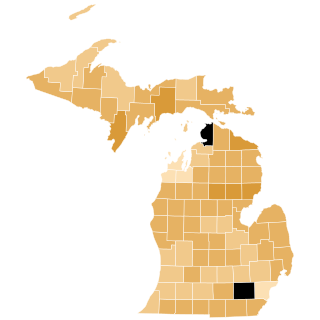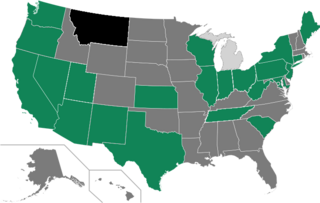The Green Party of the United States (GPUS) is a federation of Green state political parties in the United States. The party promotes green politics, specifically environmentalism; nonviolence; social justice; participatory democracy; anti-war; anti-racism. As of 2023, it is the fourth-largest political party in the United States by voter registration, behind the Libertarian Party.

The Iowa caucuses are quadrennial electoral events for the Democratic and Republican parties in the U.S. state of Iowa. Unlike primary elections, where registered voters cast ballots at polling places on election day, Iowa caucuses are meetings where voters gather to discuss and select candidates for their registered party. Political parties hold the caucuses, in contrast to most state-run primaries. Both presidential and midterm elections in Iowa use caucuses. The caucuses are also held to select delegates to county conventions and party committees, among other party activities.
The Green National Convention is the presidential nominating convention of the Green Party of the United States (GPUS). Though the Green National Committee (GNC) meets annually in a "national meeting", the convention is convened by the GNC once every four years in order to nominate an official candidate in the upcoming U.S. presidential election, and to officially adopt the party platform and rules for the election cycle.
The Green National Committee (GNC) is the central governing body of the Green Party of the United States. The committee is composed of over 150 delegates from every affiliated state party and recognized caucus. The GNC oversees all national party functions and elects a steering committee to oversee day-to-day operations.

From January 3 to June 3, 2008, voters of the Democratic Party chose their nominee for president in the 2008 United States presidential election. Senator Barack Obama of Illinois was selected as the nominee, becoming the first African American to secure the presidential nomination of any major political party in the United States. Due to a close race between Obama and Senator Hillary Clinton of New York, the contest remained competitive for longer than expected; neither candidate received enough pledged delegates from state primaries and caucuses to achieve a majority, without endorsements from unpledged delegates (superdelegates).
The Green Party of the United States originated in 1984 when 62 people from the U.S. gathered in St. Paul, Minnesota and founded the first national Green organization - the Committees of Correspondence. The Green Party of the U.S. has gone through several evolutions, from debating theory and praxis in the 1980s, to starting state parties in the 1990s, to the founding of a national political party in the 2000s.
The results of the 2008 Democratic Party presidential primaries are the detailed outcomes of a series of contests by which members of the United States Democratic Party chose their candidate for the 2008 U.S. presidential election. The contests are held in each of the fifty U.S. states, as well as the District of Columbia, Puerto Rico, American Samoa, Guam, the U.S. Virgin Islands, and Democrats Abroad. The Northern Mariana Islands was the lone U.S. state or territory which did not have a primary or caucus election in 2008. The outcomes include totals of delegates selected as well as popular votes.

The 2008 Michigan Democratic presidential primary took place January 15, 2008. Originally, the state had 156 delegates up for grabs that were to be awarded in the following way: 83 delegates were to be awarded based on the winner in each of Michigan's 15 congressional districts while an additional 45 delegates were to be awarded to the statewide winner. Twenty-eight unpledged delegates, known as superdelegates, were initially able to cast their votes at the Democratic National Convention in Denver, Colorado.
The 2008 Green National Convention took place on July 10–14, 2008 in Chicago, Illinois at the Palmer House Hilton and Symphony Center. This served as both the venue for the National Convention and the Annual Meeting of the Green Party of the United States.

Voters of the Republican Party elected state delegations to the 2012 Republican National Convention in presidential primaries. The national convention then selected its nominee to run for President of the United States in the 2012 presidential election. There were 2,286 delegates chosen, and a candidate needed to accumulate 1,144 delegate votes at the convention to win the nomination. The caucuses allocated delegates to the respective state delegations to the national convention, but the actual election of the delegates were, many times, at a later date. Delegates were elected in different ways that vary from state to state. They could be elected at local conventions, selected from slates submitted by the candidates, selected at committee meetings, or elected directly at the caucuses and primaries.

From January 3 to June 5, 2012, voters of the Democratic Party chose its nominee for president in the 2012 United States presidential election. President Barack Obama won the Democratic Party nomination by securing more than the required 2,383 delegates on April 3, 2012, after a series of primary elections and caucuses. He was formally nominated by the 2012 Democratic National Convention on September 5, 2012, in Charlotte, North Carolina.

Presidential primaries and caucuses of the Republican Party took place within all 50 U.S. states, the District of Columbia, and five U.S. territories between February 1 and June 7, 2016. These elections selected the 2,472 delegates that were sent to the Republican National Convention. Businessman and reality television personality Donald Trump won the Republican nomination for president of the United States.

This article contains the results of the 2016 Republican presidential primaries and caucuses, the processes by which the Republican Party selected delegates to attend the 2016 Republican National Convention from July 18–21. The series of primaries, caucuses, and state conventions culminated in the national convention, where the delegates cast their votes to formally select a candidate. A simple majority (1,237) of the total delegate votes (2,472) was required to become the party's nominee and was achieved by the nominee, businessman Donald Trump of New York.

The Green Party of the United States held primaries in several states in 2008. Cynthia McKinney won most of the primaries and was formally nominated as the party's nominee during the 2008 Green National Convention.

The 2020 Green Party presidential primaries were a series of primary elections, caucuses and state conventions in which voters elected delegates to represent a candidate for the Green Party's nominee for President of the United States at the 2020 Green National Convention. The primaries, were held in numerous U.S. states on various dates from early spring into early summer of 2020, and featured elections publicly funded, concurrent with the Democratic Party and Republican Party primaries, and elections privately funded by the Green Party, held non-concurrently with the major party primaries.

Below is a detailed tally of the results of the 2020 Republican Party presidential primary elections in the United States. In most U.S. states outside New Hampshire, votes for write-in candidates remain untallied.
This article contains the results of the 2020 Democratic Party presidential primaries and caucuses, the processes by which the Democratic Party selected delegates to attend the 2020 Democratic National Convention from August 17–20, 2020. The series of primaries, caucuses, and state conventions culminated in the national convention, where the delegates cast their votes to formally select a candidate. A simple majority (1,990) of the total delegate votes (3,979) was required to become the nominee.
This article contains the results of the 2020 Green Party presidential primaries and caucuses, the processes by which the Green Party of the United States selects delegates to attend the 2020 Green National Convention.

The 2024 Green Party presidential primaries and caucuses are a series of electoral contests to elect delegates to the 2024 Green National Convention who will choose the Green Party's presidential nominee in the 2024 presidential election. The convention was held as a virtual event from August 15 to 18, 2024.
"Uncommitted" is a voting option in some United States presidential primaries. This option is listed along with the names of individuals running for the position and is often described as "none of the above". Depending on state and party thresholds, voting uncommitted may allow states to send uncommitted delegates to a party's nominating convention.












